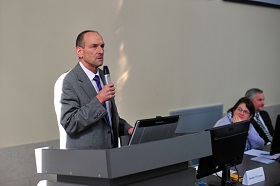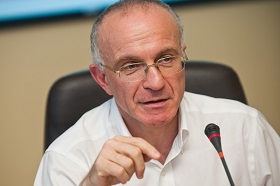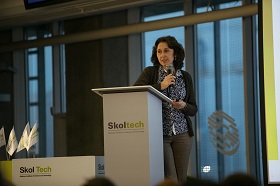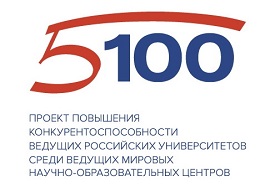Yaroslav Kuzminov: “University Is a Competitive Network Environment”
Yaroslav Kuzminov
In
Login if you are already registered
(no votes) |
(0 votes) |
Yaroslav Kuzminov, Rector of the Higher School of Economics National Research University, shares his thoughts with RIAC about universal higher education, technological interdependency of countries, and transformation of universities in the modern world. He was interviewed by RIAC programme director Ivan Timofeev and RIAC correspondent Yaroslav Menshenin.
Yaroslav Kuzminov, Rector of the Higher School of Economics National Research University, shares his thoughts with RIAC about universal higher education, technological interdependency of countries, and transformation of universities in the modern world. He was interviewed by RIAC programme director Ivan Timofeev and RIAC correspondent Yaroslav Menshenin.
Yaroslav Ivanovich, there used to be a joke: “Students lead a merry life between their exams, and they only have exams twice a year.” Is that still the way things are? And if so, why?
That approach to studying wasn’t always the case. In the 1930s students studied a lot, because their career depended on it. By the 1960s and 1970s higher education had become very popular in the USSR, and the vast majority of people started going to university. In the 1990s higher education became universal in Russia, as in many other countries: 70-80% of the relevant age group started going to university. Students stopped feeling that their future career depended on how hard they slaved away at their studies.
Of course, that doesn’t mean we should abandon universal higher education. It’s regarded as one of the greatest social achievements of humankind. But we must remember that a significant number of students are studying on the basis that “everyone else is doing it, so I’m doing it too”.
This approach presents a challenge, in that education through compulsion is bad education. Education should primarily depend on the efforts of the student.

Learning to Study Is the Key
How important is the motivation to work in a specialisation? There is a point of view that says it’s much more important to teach a student basic skills, which will enable them to fulfil their potential.
We cannot predict the future and impose it on a person. If a student has been trained as a steel worker, he’s more likely to go and work in a steel works than to sell slippers. But it would be wrong to deny him secondary and tertiary education. He might be a future John Morgan. Or he’ll create a slipper-selling industry that will bring glory to our country. But that is only one side.
The second side is the fact that there are no rigid connections between education programmes and professions. When our impression of universities and labour markets was forming, the professions had been in existence for decades, if not centuries. Today the lifetime of a particular qualification in certain industries, such as IT, is 5-7 years. How can we prepare a person for such a job? It’s quite obvious that universities are shifting towards developing the student’s ability to study rather than preparing them for a particular job.
What is the proportion of foreign specialists among the professors and teachers at the Higher School of Economics? Is this quantity enough in comparison with leading universities?
Science is global. Therefore, just as we try to work using the best technologies, regardless of whether they have been created in Novosibirsk or in Bremen, we try to find our best colleagues regardless of whether they come to us from Pakistan or from Ukraine. That’s the way all universities operate if they can. The Higher School of Economics currently has about 200 foreign professors and academic staff, which makes us the university with the biggest proportion in Russia according to this indicator. But even so that is less than 10%. If we take the global American and British universities, the figure is about 40-60%. Russian universities could invite far more foreign specialists and students. The reasons for the limitations are economic.
At the same time we must note that the Russian leadership has recently been incentivising the leading universities to become global, attract foreign teachers and foreign students and become a more active part of the global academic community. There is a 5/100 programme, the aim of which is not to fight for places – that is the formal aim – but to become significant players on the international stage, because education today is one of the key elements in global politics and global influence.
Other programmes are being implemented alongside the 5/100 programme – such as the mega-grants or “Global Education” programme. In view of the international and economic situation, can it be said that this trend is continuing?
Yes, I think it is. I regularly encounter the situation where fully educated people confuse two things. They confuse “where to go” with “how to get there”; in other words, they confuse national interests and using the results of global science. These are quite different things. If we are heading east and others are heading north, it doesn’t mean we shouldn’t copy the style of their boots if they are comfortable. And of course, we can go on foot when others travel by train.
I understand that the difficult situation in the world is the reason why such questions are emerging. But I have to say that like the overwhelming majority of my colleagues I am a patriot. It is not necessary, however, to confuse patriotism with idiocy.
Is it likely in your view that the difficulties in the global world will help the Russian economy to move onto an innovative track?
Innovation is the inner demand of creative people to create something new. If we look at the big breakthroughs – for example, the emergence of agriculture, when people started to cultivate the land rather than gather its fruits, or to breed animals rather than hunt them – the innovations were linked to a food crisis: innovations emerged as a result of one natural cataclysm or another, which forced people to survive on a smaller area of land. Other innovations also emerge: they are prompted by economic demands. If everything is going well for a firm, all things being equal it will share the dividends between the shareholders rather than invest them in new engineering centres.

"Unified State Exam Is a Step in the Right
Direction"
It’s important to note that the main condition for an innovative environment is competition rather than prosperity, and the absence of surplus. The economy should run on competitive lines, so that those who offer innovative solutions win. As soon as a monopoly rules in the economy, innovation dries up. The suppression of competition by those who can suppress is a problem that exists both here and in the West. The Russian economy is excessively characterised by monopolies: there is the state, which owns a large quantity of assets and acts as the arbiter. Therefore efficient economic behaviour – fighting for a place in the distribution of resources – is much more beneficial than, for example, creating laboratories.
Is it fair to say that alongside countries’ economic interdependence there exists another that is equally strong – technological interdependence?
Yes, it is, and one should add that this dependence is powerful and it will grow with every passing year. It may be some consolation to say that an American can say the same about himself, since all technologies are global. The USSR collapsed because we were trying to replicate the entire technological range across a quarter of the world, and that proved to be a strategy for failure.
This is what I would say: if the Americans argue with a significant part of the rest of the world it will be very bad for them too, despite the fact that they may seem richer.
Let’s return to educational matters. Russia has moved to the Bologna system, but the arguments about where an engineer can be trained in four years won’t go away.
We have professions that are a lot more dependent on the length of training – professions such as economics teacher or doctor. They should study for 7-8 years in order to achieve minimal effectiveness. The objective of the bachelor’s degree course is not to train a specialist. The objective of a Bachelor degree is to train a person who is capable of becoming a specialist. In this respect the Bologna system has a clear logic: in the first stage the person is equipped with particular analytical skills, for example as a general mathematician.

Russian science. Beware of Poverty and
Affluence
The bachelor’s degree in engineering should train a person who knows how to design and to evaluate the risks of designing.
I would like to emphasise once again: we should abandon the idea that someone who graduates with a bachelor’s degree from a technical university is a completely trained engineer. Such a person is simply on the way to becoming an engineer.
In your article “The academic community and academic contracts: recent challenges and responses” you said that universities are now competing with many other organisations for minds and talents. If the formula “less pay in exchange for greater freedom” no longer applies, what will the new formula for relations between universities and their staff look like?
I would clarify it: “less pay in exchange for a better environment”. There are people who are comfortable working in a bureaucratic organisation and who are not comfortable choosing. Universities are places that attract people for whom it is important to choose.
But one also has to admit that the university has recently been losing its position as a unique place of freedom: other similar organisations are emerging.
Other advantages which make the university a unique place are therefore coming to the fore today. These are a commitment to creating innovations, a commitment to training talented young people with whom you can interact and whom you can recruit. In practice universities now attract people who are close to entrepreneurial activity. It is no accident that universities are developing technological parks, business incubators, etc.
In universities there are professors who are entrepreneurs, there are entrepreneurs who are part-time professors, there are graduates who have not broken their links with their alma mater. In universities the concentration of talents, innovations and ideas is high. This is why questions are arising that used to be not quite characteristic of universities – questions such as competition. In addition, the form of reciprocal payments between entrepreneur-professors and the university is become more complex. The model of the university is undoubtedly changing these days.

Irina Abankina:
Education in 100 Years: Challenges from
the World Beyond
Could one say that nowadays we need not just a contract between the university and the teacher, but also one between the university and the graduate student? And also perhaps one between the university and the school pupil?
When we say “contract” we are assuming obligations on both sides. Questions arise. Does the university’s contract with the student include obligations for the student? Or does it include only obligations for the university? What should these obligations include? What should the university guarantee? We are actively competing for students and offering more and more social life, research opportunities, bursary support, etc.
But are the students competing for the universities? It would seem they compete up to the moment they get in. But do they compete after that? Here too there should probably be certain complicated forms of contract – definitely prescribed. The simplest contract: if you get better than C grades in your studies you can do your own projects and take part in the social life of the university. And that is freedom for the student. But if you want to be noticed in the university and have a career – not just in the academic world but also in business and in the social affairs which abound in the university – you must go beyond the simplest obligations. You should go to the professor as a teaching assistant or into the laboratory as a research assistant; you should work as a volunteer in social initiatives. In other words, you should be noticed. This kind of approach is gradually taking root. It’s not a competition for an assessment, for an A grade after which you’ll be given a 1,000 rouble bursary. It’s not a contract but a competitive network environment in which people fulfil their interests, and students have very varied interests.
(no votes) |
(0 votes) |




